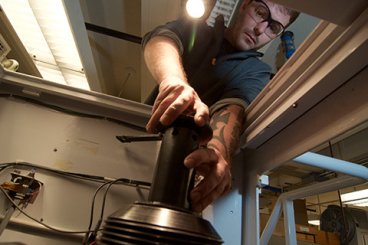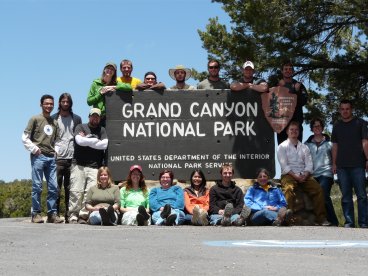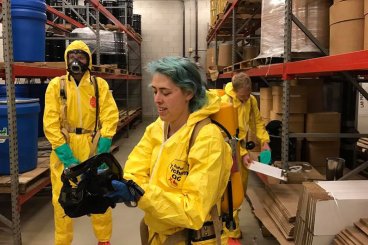Outside the Classroom
Research Opportunities

The University provides many ways in which a student can participate and gain experience in research. The majority of faculty in our department actively participate in one or more of the these programs. Research in Earth & environmental sciences can include lab or field work, or both!
We encourage students to look at the different opportunities for these activities at the U's Office of Undergraduate Research, as well as learn what types of research is going on in our department: Discover Research in our Department.
Common in our department are
- UROP (Undergraduate Research Opportunities Program): Provides funding to U of M undergrads who work on a research, scholarly, or creative project with a faculty mentor.
- Research as a student employee funded by individual an faculty member's research grants.
- Internships:
- The U's Office of Undergraduate Research provides a list of internships both in and outside the U.
- The Department has a mechanism for students to register (ESci 3896) for students who are in the process of doing an internship related earth and environmental sciences at a firm, nonprofit organization, or public agency (at the federal, state, county, or municipal level) that is off-site from the University. Consultation with the Director of Undergraduate Studies is required.
- We often receive notifications about internships not noted above, which are forwarded to the students, a few examples are
- Directed Studies: earn academic credit toward your degree by working under a faculty member’s guidance. Be sure to discuss with your advisor and instructor before registering or filling out the contract.
- Senior Thesis: Seniors majoring in either Earth Sciences or Environmental Geosciences are encouraged to complete an undergraduate thesis project. The first step in organizing a senior thesis project is for a student to select a faculty or staff mentor, who may then agree to help advise the student through the thesis process. More details, including access to an example of a recent, strong thesis.
Field Courses and Experiences
Learning to make original, quantitative observations about the natural world while outdoors (in the 'field') in rural and/or urban environments is an essential part of modern Earth and Environmental science.
All our undergraduate programs currently require the completion of two summer field courses.
- All students are required to take ESCI 3911, Introductory Field Geology which is based in Montana.
- Students are then required to complete one of the following two advanced field courses, both based in Minnesota:
- ESCI 4911, Advanced Field Geology, taught in Minnesota or
- ESCI 4971W, Field Hydrogeology.
- Each of these three field geology courses are ~3.5 weeks long and worth 4 credits apiece. These courses are full-time learning experiences (morning to evening) that take place away from campus, sometimes in another state. They are purposely scheduled not to overlap, so that students may take both field courses in a single summer if they choose. This scheduling arrangement has the added benefit of preserving an additional summer for a research or job experience.
Please read more about our Summer Field Courses.
In addition to the summer field courses, many major core courses include a field excursion so as to view what the student are learning into real world context.

May Field Trip: the undergrad students (GeoClub) work with the department to schedule an end-of-year field trip led by a faculty member/instructor in the department. Students register for a one-credit course during the spring semester preceding the trip in order to research and learn about the area(s) in which they will visit. Although the department contributes funds and the GeoClub conducts fundraising throughout the year, it is typical that the student will incur some of the costs for the trip.
Recent trips have been to Sierra Nevada Mountains, Desert Southwest U.S. (including the Grand Caynon), and Adirondacks in the northeastern U.S.
In addition to opportunities offered by the University, there are chances for students to engage in field experiences outside of the U of M system. The Summer of Applied Geophysical Experience is one option. "The primary goal of SAGE is to actively educate students in all phases of geophysics using modern field equipment and the latest computer processing and interpretation tools. SAGE emphasizes the understanding of field methods—from fundamental principles through acquisition, processing, and interpretation—all within the context of basic and applied research problems."
Practical Skills for Professional Geoscientists - ESci 5805, 3 credits

This course is meant to provide training in practical skills regularly used by geoscience professionals in industry and agency and is targeted for both upper level undergraduates and graduate students. Aspects of the course include:
- Preparation and guidance for the National Association of State Boards of Geology (ASBOG) Fundamentals of Geology (FG) exam. This exam is a required step on the way to becoming a registered geologist. The exam is offered in mid-March, and the expectation is that students participating in the class will take it.
- Coordination and completion of the 40 hour HAZWOPER training through UMN.
- Detailed review of regional stratigraphy, bedrock and glacial geology and how they relate to various industrial applications and environmental issues.
- Review of state and federal environmental regulations, as well as the phases of environmental impact statements.
- Review of fundamental investigation techniques (GeoProbe drilling, hollow-stem auger drilling, well installation, analytical testing – soil, groundwater, air).
- Survey of environmental clean-up grants.
- Invited lectures from select representatives of various subfields and professional organizations (groundwater & contaminant hydrogeology, mining & geophysical exploration, environmental engineering, petroleum) to give students a jumpstart in their professional networking.
Student Groups
The official student group in the department is the University of Minnesota Geological Society (UMGS), a.k.a. GeoClub. The GeoClub has been active in outreach both within the department and at the University.
Other related groups in which students can become involved include (not an exhaustive list)
- Geological Society of America (GSA)
- Society for Mining, Metallurgy, & Exploration (SME)
- Minnesota Groundwater Association
- Association for Women in Science
Departmental Seminars
The department holds several regular seminars and gatherings during the school year and undergraduate students are welcome and encourage to attend (all currently online due to covid):
- Departmental seminar is held weekly at 4 p.m. every Thursdays in Tate Hall.
- Soft Rock topics and Justice, Equity, Diversity, and Inclusion (JEDI) topics seminars are typically held every Monday over the lunch hour in Tate Hall.
- Hard Rock topics and Justice, Equity, Diversity, and Inclusion (JEDI) topics seminars are typically held every Wednesday over the lunch hour in Tate Hall.
- Minnesota Geological Survey hosts a seminar series, at the MGS which is off campus when in-person returns.
Please visit the Department's Events and Seminars page for more details.
Internships and Summer Courses
Information Science and Technology Institute (ISTI): Implementing and fostering collaborative research, workforce and program development, and technical exchange
The Information Science & Technology Institute (ISTI) sponsors a number of summer programs for students. These summer programs give students the opportunity to work with scientists on research projects that address emerging challenges in national security.
Lawrence Livermore National Lab summer 2022:
Atmospheric, Earth and Energy Division: Covers atmospheric science, climate and carbon cycle research, seismology, hydrology, geoscience, environmental science, accelerator mass spectrometry (AMS), and nuclear energy research.
- Graduate (https://www.llnl.gov/join-our-team/careers/find-your-job/all/seaborg/3743990000058162)
- Undergraduate (https://www.llnl.gov/join-our-team/careers/find-your-job/all/atmospheric/3743990000058202)
Nuclear and Chemical Sciences Division: Covers computational chemistry and physics, radiochemistry, nuclear and high energy accelerated physics, nuclear theory and modeling, nuclear forensics, but note that the skills that come with a geochemistry background are very compatible with some of this division’s work.
- Graduate (https://www.llnl.gov/join-our-team/careers/find-your-job/all/seaborg/3743990000057955)
- Undergraduate (https://www.llnl.gov/join-our-team/careers/find-your-job/all/seaborg/3743990000057960)
Seaborg Institute Internships: Focuses on nuclear science and security, but this program has taken geoscientists to work on things like isotope chemistry for forensics, environmental chemistry for remediation, and seismometry for nuclear event detection. More information about the Seaborg Institute can be found here: https://seaborg.llnl.gov/career-opportunities